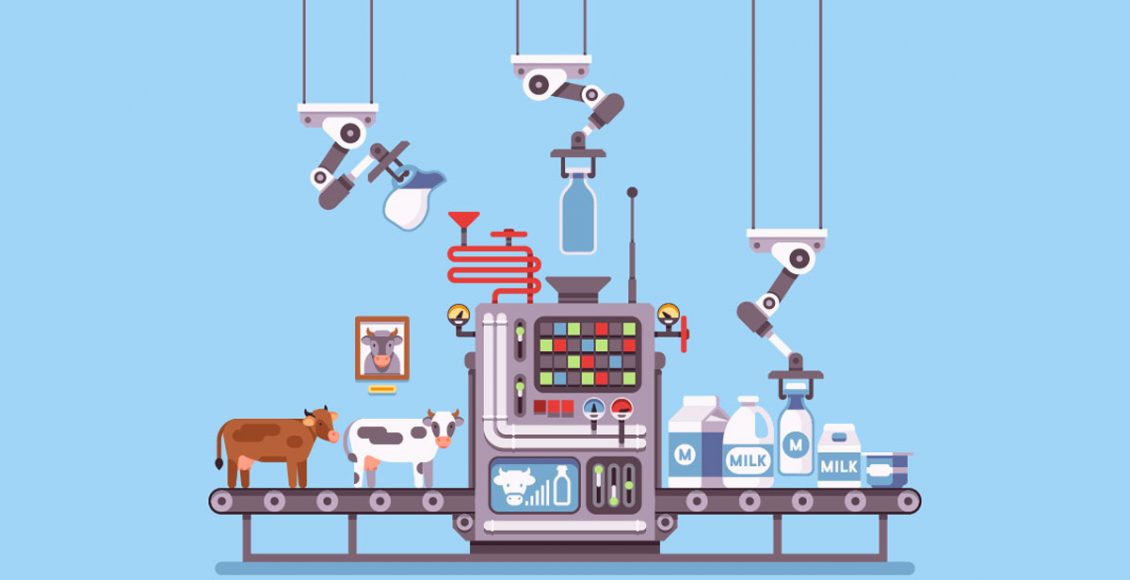
Dairy-Tech: Revolutionizing the Indian Dairy Industry
With over 90 million dairy farmers, the Indian dairy market achieved an annual output of 198.40 million tons during 2019-20 compared to 187.75 million tons in 2018-19, recording a growth rate of 5.68%. This was contributed by the rise in dairy cattle numbers and improved feed and fodder availability. Despite being the largest producer and consumer of milk, India’s per capita dairy consumption levels are significantly lower than in developed countries. India is neither an active importer nor an active exporter in the Milk sector.
How is technology changing the dairy industry?
At Farm Level:
The dairy sector’s primary constraint is the low productivity across dominant species of dairy animals- cows and buffaloes. The population of high-yielding cross-bred animals has seen slow growth in India, contributing only 28% of the total milk production, with the rest being contributed by the indigenous breeds. Apart from productivity challenges, animal health monitoring, lack of quality fodder and feed, and limited market access, have been critical bottlenecks in the dairy sector. Precision dairy farming has been introduced to maximize animal performance and early detection of diseases in cows. In 2018, the Karnataka government implanted GPS-enabled digital chips to the ears of 56 lakh animals across the state to track their health and early diagnosis of any medical condition. Cattle monitoring via AI-based solutions is still in its infancy in India, with only a few companies providing this service. Stellapps Technologies is digitalizing and enabling supply chain traceability for dairy companies by developing a wearable technology that helps in efficient herd management. Companies such as Allflex and GEA are offering RFID tags for cattle management in India. Ag-tech start-ups like Brainwired and VetWare have developed herd management applications for better cattle record keeping.
Collection and Procurement:
Over the years, reports and surveys by FSSAI have shown high levels of adulteration and contamination in milk. More than 5% of the milk tested by FSSAI in 2019 was reported to be contaminated with Aflatoxin M1 residues and deemed unfit for human consumption. Cases of intentional adulteration of milk to increase the volume by using water, increasing thickness through adulterants like glucose, starch, and paint, have also been reported widely in the country. Rapid milk quality testing kits have been recently approved by FSSAI, which can help curb these instances at the procurement level and monitor and maintain the quality of milk for processing and further value addition. The FSSAI approved kits for detecting aflatoxins, antibiotics, and microbial contaminants in dairy are supplied by players such as Unisensor, 3M India Ltd, Jupiter GlassWorks, Delmos Research Ltd., etc. Apart from testing at the collection centres, at-home testing kits have also been developed by companies like Biosyl Technologies and VeriPure for customer reassurance.
With the increase in the complexity of the dairy supply chain system, consumers know very little about the products produced or processed by producers or processors. Such information asymmetry present in the dairy industry has serious concern over human health, environmental sustainability, and welfare issues. There is a need to improve the communication between the supply chain players to enhance coordination and maintain traceability. Blockchain adoption in dairy can provide complete transparency in the end-to-end order and delivery process, thereby increasing adherence to regulatory norms and decreasing the instances of adulteration. This system can be used in tracing food information, including farm operations conducted and support in building a trust level among the various stakeholders. Reliable tracking of every batch in the milk value chain can help establish traceability, identify the defective products and discard the batches that have been impacted.
Processing and Transportation:
Although the dairy industry is not an energy-intensive sector, higher energy needs are requisite in the proper storage and transportation of milk. Remote regions with many dairy farms do not have adequate electricity to power cold chain facilities, leading to loss.
Dairy farms in remote locations with poor grid connectivity are at a severe disadvantage and face loss in quality and economic terms. According to ASSOCHAM estimates, about 3% of the milk produced gets wasted annually. A diesel generator for power backup is the current option for village-level chilling, which is expensive, less eco-friendly, and needs regular maintenance. Alternatives such as thermal energy-based storage and chilling systems by players such as Promethean Power Systems and Ecogen Energy can address the needs of dairy farms in off-grid locations. With thermal energy-based cold storage being a more cost-effective replacement for diesel-generator backup, collection centres and dairy processors are assured of better quality and volumes of milk and lower operational costs.
The dairy industry has a large carbon footprint during milk processing from the farm to the retail supply chain. Water consumption during milk production and processing is also high, which can be controlled through sustainable solutions. Wastewater treatment in the dairy industry in India is done in three phases through filtration systems, effluent treatment systems, and aerobic treatment. These methods require more efficiency with the increased production capacities. The introduction of cloud-based technologies can help the dairy industry reach maximum efficiency and reduce water consumption through smart monitoring and real-time water usage tracking. Fluxgen Engineering Technologies, a Bangalore-based start-up, uses IoT and AI to help manage and regulate water usage in food processing and manufacturing plants, can use efforts to increase efficiency in such processes through digitization. Their AquaGen system helps in real-time productivity and water consumption monitoring, which has reduced water usage by 15%, translating to monetary savings for a dairy farm in Puducherry.
Export Market:
There is a broad scope to improve and increase the processing capacity of industries and direct a more significant share of milk and milk products through the formal channel. With the shift towards convenience products, there is a need for advancements in the processing and packaging of milk products. Appropriate R&D interventions and newer developments in the dairy processing area, focusing on novel aspects of emerging technologies, can help alleviate the quality of these products in the domestic and international markets. India’s low share of dairy exports globally (0.36%) can be increased with increasing processing capacity of products that hold potential in the global market, such as cheese, skim milk powder, whole milk powder, and butter, and improving quality capable of meeting international requirements.
Retail and Distribution:
Keeping track of trucks and tanker routes and capabilities for viewing, monitoring, and payment based on route or distance has been complex in a largely unorganized market in India. The Kerala state government is implementing a project to leverage blockchain technology to streamline the state’s milk, fish, and vegetable purchase and distribution. The project aims to ensure speedy delivery of high-quality milk by continuously monitoring production, procurement, and distribution through an electronic ledger.
A fault in the proper transfer of dairy items by such companies leads to spoilage of products due to the perishable nature of these food commodities. Integration of the internet of things with the Blockchain platform helps gather the information needed during the transfer of goods from one place to another to be easily traced.
RFID tags and mobile applications are being used to monitor the movement of trucks and refrigerated tanks to make sure they adhere to fixed parameters like the temperature in which the products are to be kept to maintain the quality of the products. Indian dairy-tech start-up Mr. Milkman is a last-mile dairy supply chain SaaS platform that enables dairy food product companies to efficiently manage multiple aspects of dairy distribution, supply chain, customer subscriptions, and delivery requests.
With dairy-tech start-ups entering the space and bridging the gaps in cattle management and the supply chain, the scenario is changing. There is a need for investment in technology to keep up with the changing consumer needs for transparency, traceability, and quality assurance. The future of the Indian dairy sector appears bright, as digitalization is expected to usher in a new era of growth.
Author:

Associate Consultant – Food Processing and Retail practice
Connect with Author at: E-mail foodbiz@sathguru.com
 Grow Beyond
Grow Beyond 

